In my career I have come across numerous projects and initiatives by commercial farmers to improve the lives of the poor and destitute. Their goodwill and sense of community often stands between hunger and a full stomach.
Let’s look at a few of the initiatives I’m talking about.
The Bothaville Soup Kitchen provides at least 3 000 meals in the Kgotsong location per week. For many it’s the only meal of the day. This project is kept going by commercial farmers and the people of Bothaville. Chief organiser Rikus Venter told me they’ve received 70t of maize meal from local farmers for 2012 so far, as well as a regular supply of vegetables such as carrots, pumpkin and spinach.
Bothaville’s commercial farmers initiated the Nampo Agricultural School some 25 years ago. The school has developed from 125 learners accommodated in tents to a prize-winning institution with 600 learners ranging from Grade R to Grade 12. The school has maintained a 100% Grade 12 pass rate since 2007.
In Bultfontein commercial farmers support care facilities for AIDS orphans and intellectually challenged children by providing maize meal and other food. They also support township farmers who keep livestock on municipal land with inoculation programmes to prevent animal diseases.
A few years ago the farmers made tractors, trailers and trucks available and pitched in to help clean up and repair the streets in the local township. Most of the meat hunted on Francois and Sandra de Wet’s game farm in Boshof is used for a food bank in the town. The meat is butchered, packaged and handed out free of charge to the poor.
The problem is that the people in power simply don’t know of the sterling community work done by the farmers all over SA. Maybe an organisation such as Agri SA should take it upon itself to bring this goodwill and commitment to the attention of government.
I strongly believe this will go a long way to change the negative perceptions in government circles about farmers. The commercial farming sector should start emphasising the role its members play in the broader South African society much more forcefully.









